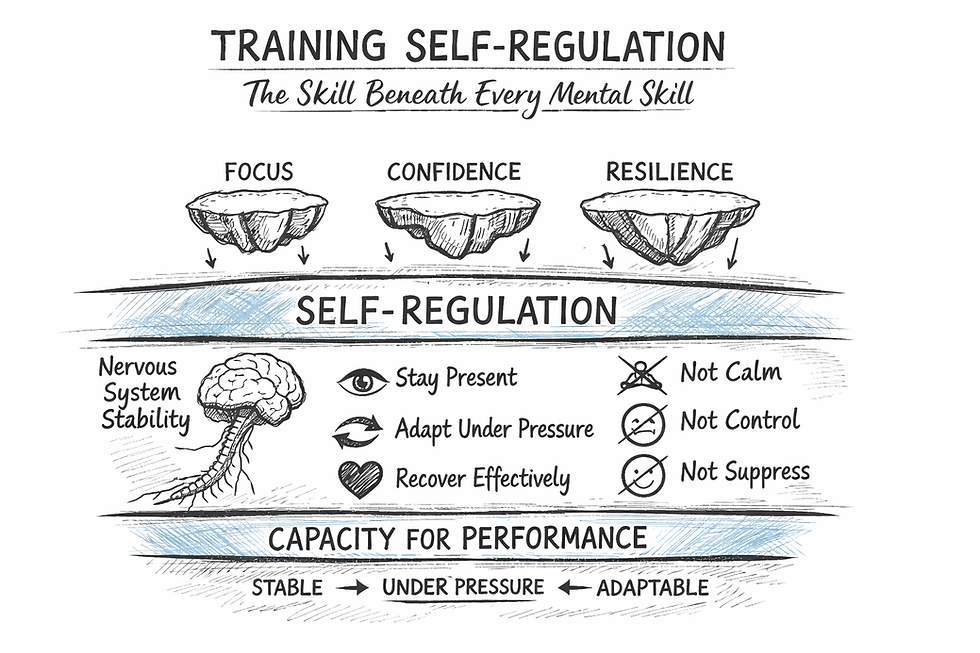Understanding a Sports Performance Mindset
- Kate Allgood
- Jul 11, 2023
- 3 min read
Updated: Dec 18, 2023
Sports performance mindset refers to the mental attitude and approach that athletes adopt to enhance their performance in sports. It's about developing a positive and focused mindset that helps athletes perform at their best, overcome challenges, and achieve their goals.
Here are a few key aspects of the sports performance mindset:
1. Goal Setting: Athletes set clear and specific goals for themselves. These goals can be short-term (like improving a specific skill) or long-term (like winning a championship). Goals provide direction and motivation, helping athletes stay focused on what they want to achieve.
2. Positive Thinking: Maintaining a positive mindset is crucial. Athletes focus on their strengths and believe in their ability to succeed. They visualize success and use positive self-talk to boost their confidence. By replacing negative thoughts with positive ones, athletes can stay motivated and resilient, even in difficult situations.
3. Focus and Concentration: Athletes train themselves to concentrate on the task at hand and avoid distractions. They develop the ability to block out external factors and stay fully engaged in their performance. By staying focused, athletes can make quick decisions, react faster, and perform at their peak.

4. Resilience: Sports can be challenging, and setbacks are common. Athletes with a strong performance mindset view setbacks as opportunities for growth. They bounce back quickly from failures, learn from their mistakes, and stay determined to improve. Resilience helps athletes stay motivated and persevere through tough times.
5. Mental Preparation: Just like physical training, athletes need mental preparation. They use techniques such as visualization, where they imagine themselves performing successfully, and mental rehearsal, where they mentally practice their skills. These techniques help athletes build confidence, reduce anxiety, and perform better under pressure.
6.Focus on Process: While goals are important, athletes with a strong sports performance mindset focus on the process rather than just the outcome. They understand that consistent effort, dedication to training, and continuous improvement are key to long-term success. By focusing on the process, athletes can stay motivated and enjoy the journey of becoming better.
Remember, developing a sports performance mindset takes time and practice. It's about training your mind just like you train your body. By adopting these principles and working on your mental game, you can improve your performance and enjoy sports to the fullest! If you want help in developing a sports performance mindset, get in touch and see how I have helped hundreds of athletes from high school to professional build their mental game.
To your success,
Kate
About: Kate Allgood is trained in the field of applied sport psychology. She holds two Masters degrees in psychology where she graduated with distinction. She has spent the past 14 years working one on one with high school, college, Olympic, and professional athletes to help them with their mindset, mental performance and mental skills training. Kate has also been a consultant for professional teams, including the Anaheim Ducks primary minor league affiliate the San Diego Gulls, to help the team and players develop their mental game. It is important to note that while Kate has graduate school training in applied sport psychology and general psychology, she does not diagnose or treat clinical disorders, and is not a licensed psychologist.
**The information provided is not to dispense medical advice or prescribe the use of any technique, either directly or indirectly, as a form of treatment for physical, emotional, or medical problems, without the advice of a physician. The information provided is only to offer information of a general nature to help you in your quest for high performance. If you know or suspect you have a health problem, it is recommended you seek your physician's advice.



Comments